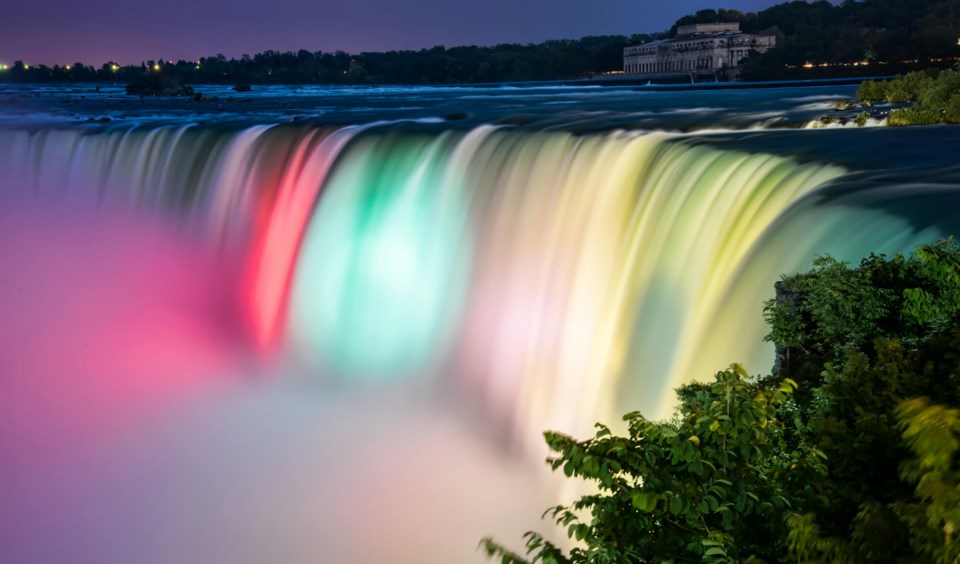Immigration, Refugees and Citizenship Canada (IRCC) will push more than a hundred asylum seekers housed in Niagara Falls hotels at government expense towards the exit door, Le Devoir has learned. Others will be moved to new accommodation in the city on Friday.
This rehousing in different hotels is occurring before the start of the tourist season, according to community organizations. Pastor Wally Hong, who helps many of the city's refugees, even suspects that the maneuver was brought forward due to the eclipse happening on April 8, which should attract thousands of curious people to the Ontario municipality.
“What’s happening is that the tourist season is coming. […] And there is something else, this time, which is that some hotels are asking the government to see if it can move forward a little [the rehousing of asylum seekers] because of the eclipse, says Mr. Hong. It’s not necessarily planned, but it’s added pressure." At the time of writing, the establishments concerned had not indicated their motivations to Le Devoir.
In this town of around 95,000 inhabitants, the price of hotel rooms for the night of April 7 to 8, the day when the eclipse will be total, has increased from around a hundred dollars to more than $1,000.
“Tourists, when they come to Niagara Falls, they spend. So, there are economic spinoffs,” explains Bonaventure Otshudi, director of services for newcomers at the Hamilton/Niagara Community Health Center. “Asylum seekers don’t spend. […] They are fed, they are housed."
The day before their departure, neither the community organizations nor the asylum seekers knew where they were going to be relocated. However, there was no question of them being moved outside the city.
According to our information, some were relocated on Friday just two streets from their previous hotel, but they went from 4-star accommodation to 2-star accommodation. It is now no longer possible to reserve a room in the second establishment until mid-January 2025, which gives an overview of the duration of the contract signed with IRCC.
According to Mr. Hong, some asylum seekers chose to leave hotels and head to Victoria, Edmonton or Toronto, “because of this pressure of having to move” on Friday. For their part, the refugees met by Le Devoir a few days before the operation did not really care about this move, welcoming any accommodation option offered by the government with gratitude.
Niagara Falls Mayor Jim Diodati did not respond to interview requests.
“They could send me to Toronto, it doesn’t change anything for me,” says one of them, whom we use the fictitious name John for security reasons. “I’m not paying for it, you know, so […] I’m just grateful” to the Canadian government. Arriving at Pearson Airport during the last holiday season, the Bahamian says he walked all night in the "freezing cold", only to run into the closed door of an administrative office that he thought was a refuge .
“I had nowhere to go, my hands were frozen, so I went back to the airport and was ready to give up."
Thanks to the help of his sister, still in the Caribbean, he finally found a “crowded” shelter, where he stayed for a little over a week, before being transferred with around “fifty” others asylum seekers in a Niagara Falls hotel.
Planned evictions
For the first time, IRCC also plans to evict 134 asylum seekers in mid-April, according to community organizers. Until then, they will have to find their own accommodation.
Housed and fed at government expense for several months, they all obtained the status of “protected person”, according to what Ottawa indicated to community organizations. In the event that the search for housing is unsuccessful, in a context of soaring rents, IRCC would not put these people on the street, they believe.
According to Nickensonievsky Aubourg, an agent at the Hamilton/Niagara Community Health Center who travels to hotels to advise asylum seekers, IRCC’s decision is a “good thing.”
“It will allow people to know that it is temporary shelter, that it is not long-term,” which could, according to him, encourage them to start their search for an apartment sooner, but also show them that “the immigration process works”.
Le Devoir attempted to speak with an IRCC agent whose office is located within one of the four hotels where asylum seekers are housed. We were immediately escorted to the exit. The day before, an administrative employee of another hotel establishment had threatened to involve the police if Le Devoir continued to ask questions of the refugees.
At the time of writing, IRCC media relations had not responded to our questions. For his part, Niagara Falls Mayor Jim Diodati did not respond to interview requests.
In July 2022, nearly 5,500 asylum seekers were transferred to Ontario at the request of Quebec, which wanted Ottawa to find solutions to manage the influx of arrivals via Roxham Road. But since the closure of this point of entry, many asylum seekers have continued to arrive on Canadian territory, notably through Pearson airport in Toronto and Montreal-Trudeau international airport. According to Mr. Otshudi, around 2,000 asylum seekers are currently housed in hotels in Niagara Falls.
Lise Denis is a Local Journalism Initiative reporter based at Le Devoir.
